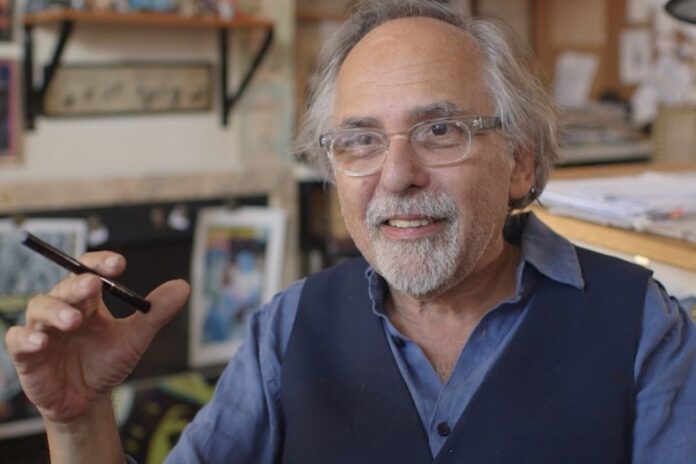Art Spiegelman: Learning from a Holocaust Survivor
Art Spiegelman has learned many things from his father, a Holocaust survivor. Among them, the ability to make the most out of limited space, a skill he applied to his hand-drawn comic panels. Spiegelman is a renowned figure in the world of comics, most known for his two-part graphic novel “Maus.” This novel, portraying Nazis as cats and Jews as mice, is primarily based on his father’s experiences during the Holocaust. It’s also a reflection of Spiegelman’s struggle with the trauma passed down from his parents. The critical success of “Maus” added a new layer of discomfort to his life.
“Art Spiegelman: Disaster Is My Muse”
The documentary “Art Spiegelman: Disaster Is My Muse” is a chronological account of Spiegelman’s journey from underground comics to mainstream fame. Directed by Molly Bernstein and Philip Dolin, the film combines interviews with Spiegelman, his family, and friends. It serves as a biography, and also a narrative about how comics transitioned from a platform for humor to one suitable for diverse narratives. “Maus” played a significant role in this shift.


Pain and Art: The Connection
Spiegelman’s conversations with Bernstein and Dolin reveal the inseparable link between his deepest pain and the art he creates. Much of his work is autobiographical, exploring his past and the people who shaped him. As he shares his life story and the steps that led to his successful career, key figures emerge, including underground cartoonist Robert Crumb and his talented wife Françoise Mouly, an editor at the New Yorker.
The Influence of Cinema
Among the interviewees, film critic J. Hoberman, a childhood friend of Spiegelman, likens his approach to comics to Jean-Luc Godard’s cinematic philosophy. He explains how Spiegelman deconstructs and examines comics in its rawest form, much like Godard did with film. Spiegelman’s life and career reveal that cinema has always had a significant influence on his work, particularly through his friendship with Ken Jacobs, a New York experimental filmmaker.
The Legacy of “Maus”
Considering Spiegelman’s groundbreaking contributions to comics and his interdisciplinary influences, one might expect a tribute to his oeuvre to take more risks. However, while the comics themselves are prominently featured on screen, the documentary remains a proficient but safe portrait. Spiegelman’s mixed feelings about gaining fame through a story that delves into humanity’s darkest abyss feel deeply sincere. Unfortunately, the relevance of “Maus” has never waned, and it continues to overshadow Spiegelman’s career as an unsurpassable, career-defining masterpiece.
Spiegelman in Today’s World
Toward the end of the documentary, Spiegelman reflects on the timely relevance of “Maus” as an anti-fascist symbol of historical memory. He criticizes the book-banning policies of the Trump administration and their chilling similarity to Nazi Germany’s policies during World War II. As a Jewish man directly connected to the horrors inflicted by the Nazi regime, Spiegelman recently collaborated with author Joe Sacco on a comic about the alarming situation in Gaza. Despite the challenges he faces, Spiegelman remains driven by the realization that personal and collective trauma will continue to fuel his work.
FAQs
Q: Who is Art Spiegelman?
A: Art Spiegelman is a renowned cartoonist, best known for his graphic novel “Maus,” which is based on his father’s experiences during the Holocaust.
Q: What is the documentary “Art Spiegelman: Disaster Is My Muse” about?
A: The documentary is a chronological account of Spiegelman’s career in comics, from underground publications to mainstream recognition. It’s also a narrative about how comics transitioned from a platform for humor to one suitable for diverse narratives.
Q: What is the relationship between Spiegelman’s pain and his art?
A: Spiegelman’s work is deeply autobiographical and is often a manifestation of his innermost pain and frustrations.
Q: How has cinema influenced Spiegelman’s work?
A: Cinema has always had a significant influence on Spiegelman’s work, particularly through his friendship with experimental filmmaker Ken Jacobs. Film critic J. Hoberman likens Spiegelman’s approach to comics to Jean-Luc Godard’s cinematic philosophy.
Q: What is the relevance of “Maus” today?
A: “Maus” remains a timely anti-fascist symbol of historical memory, particularly in the face of book-banning policies that mirror those of Nazi Germany during World War II. Spiegelman continues to be motivated by personal and collective trauma, as seen in his recent collaboration with author Joe Sacco on a comic about the alarming situation in Gaza.
Credit: variety.com


